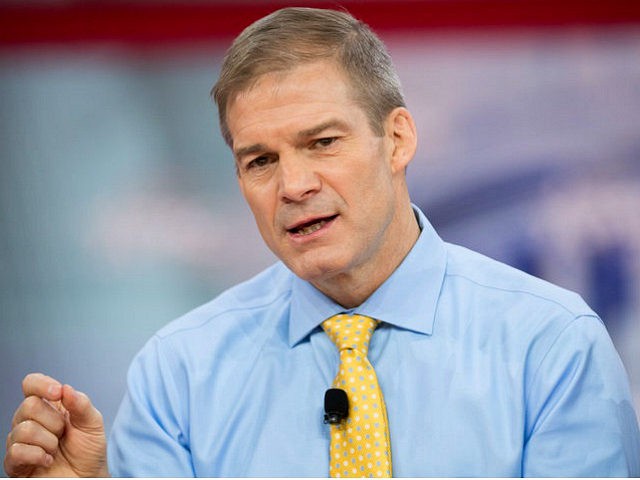The House’s GOP leadership will likely schedule an amnesty vote on June 25 if the discharge petition gets at least 25 GOP signatures, says Ohio Rep. Jim Jordan, a former chairman of the Freedom Caucus.
Jordan’s Tuesday prediction comes as House Speaker Paul Ryan called for a “compromise” on immigration. But Ryan has not offered any disagreement with the calls for an amnesty, nor has he threatened to cut funding or committee seats for the 19 Republicans who are using the discharge-petition process to help pass a Democratic-backed amnesty for at least 2 million DACA illegals.
Politico reported:
[Ryan] pleaded with his conference Tuesday to come together after a tumultuous few days of infighting. The only way Republicans will keep their majority this fall is to work as a team, he argued, urging both wings of the party to compromise on a path forward.
There are three major sticking points for the conservatives, such as Jordan and Rep. Mark Meadows, the current chairman of the Freedom Caucus.
First, conservatives say Ryan and the leadership are not applying any visible pressure against the 19 GOP candidates who have signed the amnesty discharge-petition. Ryan’s deputies are also not whipping the roughly 40 wavering GOP legislators to support their preferred bill, which has been drafted by Rep. Bob Goodlatte and Rep. Michael McCaul, respectively the chairman of the House judiciary and homeland defense committees.
“We are trying to deal on immigration with a focus and intensity that is consistent with the mandate of the 2016 election that has to happen, and, yes, leadership should work with us to get it done,” said Jordan.
Also, under existing rules, Ryan can shut down the House on the Mondays allowed for the discharge-amnesty vote. The House’s calendar allows the amnesty vote to take place on June 25 and July 23. So far, Ryan has not declared he will keep the House out of session on those two days. Ryan is slated to retire in January.
Second, Ryan and other top leaders say they are trying to develop a “third alternative” bill that could pass the House. So far, no details about the bill have been announced, but conservatives fear it will be a very unpopular gift to the party’s cheap-labor donors and will do little or nothing to raise wages or close up immigration-law loopholes.
The third alternative bill may freeze out conservatives, Florida Republican Dennis Ross told Bloomberg:
“Some of us are holding off because they’re trying to come up with a negotiated deal that’s palatable to everybody but the Freedom Caucus,” the conservative bloc of Republicans, Ross said. “They’ve asked us to hold off for another 24, 48 hours.”
Any vote for amnesty will damage the GOP caucus in a high-stakes, mid-term election where the Democrats are already enthusiastic, warned legislators. “I think the discharge petition is a mistake,” said Arizona Rep. Andy Biggs, adding:
It will cause red states and districts to struggle. The outcome of that will be a miserable outcome … You’re going to have enormous problems.
Conservatives predict a pre-election split if retiring Ryan helps pass a cheap-labor, no-strings amnesty, Politico reported:
“If we run an amnesty bill out of a Republican House, I think all options are on the table,” Freedom Caucus member Scott Perry (R-Pa.) told reporters Monday night when asked whether Ryan could remain speaker if the so-called discharge petition succeeds.
“If leadership doesn’t stop it, they would be violating their own word, which was the Hastert rule, majority of the majority,” agreed Rep. Dave Brat (R-Va.), referring to an unofficial Republican policy of not holding votes on matters that aren’t backed by more than half of the conference.
Third, conservatives want a favorable set of rules to govern floor debates on immigration.
Conservatives want separate votes on separate days for their Goodlatte’s reform and any amnesty bill.
If the Goodlatte bill and an amnesty bill are debated and voted on in the same day, the business-first Republicans will ally with Democrats to pass the amnesty — but then split their votes to ensure the defeat of the Goodlatte bill, say conservatives. That multi-bill debate rule would allow business-first Republicans — including the dairy district Republicans who are central to the discharge-petition — to tell their voters that they backed the Goodlatte bill, even though they arranged to pass the amnesty bill.
GOP leaders will go for a two-bill rule, said Ross. “The plan is to bring up the Goodlatte bill, which will probably fail, and then bring up a negotiated bill,” said Ross.
That multi-bill rule is backed by the pro-amnesty GOP legislators and is written into the discharge-petition language.
“This will result in an outcome that is not what we campaigned on, not what the president campaigned on, and [not] what we promised the American people,” Jordan said.
The centrist conservatives want a debate based just on the Goodlatte bill so they can pressure the business-first Republicans to rally behind the Goodlatte compromise.
Negotiations by GOP leadership are being complicated by Ryan’s pending retirement, which is opening cracks in the GOP caucus.

COMMENTS
Please let us know if you're having issues with commenting.